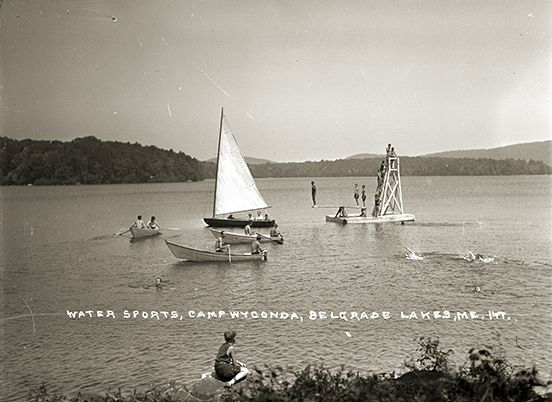
Where Would We Be Without Camps?

There’s a word in this region that is loaded with definitions, a word that means something — but not the same things — to almost everyone, that has fueled the local economy for well over a century, and that has formed the best memories of a lifetime for generations of vacationers and visitors and year-rounders who had a camp connection. Today the word, the memories the connections, the momentum of the movement continue. And today, we know that one of the most missed summer outlet during the COVID pandemic was the availability of summer camps.
Although as originally settled the Belgrade region was primarily farmland, especially apple orchards, and all the industries were driven by dams on the lakes the area was destined to become a mecca for the camp culture — fishing camps, youth camps, family camps, specialty camps, sports camps and most recently (and thankfully for working parents) numerous day camps.
Perhaps the camp trend began with the train line north with stations in both Belgrade Depot and North Belgrade. The train brought so-called sportsmen from the cities in search of good fishing and the trout and bass they caught not only put the Belgrades on the map but turned the area into a summer resort where whole families stayed in the large hotels and camp colonies and in the dozen plus fishing camps that supplied guides, boats, gear and a 5 a.m. wakeup bell.
Just as the Belgrades was becoming established on the map for fishing, the country, especially the northeast, was experiencing a wakeup call to the unhealthy influences of too much indoorness. It also was facing the challenge that the receding agrarian economy and the long summer school vacation designed for youth employment on the farms was leaving a lot of active youth with nothing to do. Bit by bit pastoral leaders experimented with variations on the almost unknown concept of camping. The concept worked and it led to the nature-oriented, wholesome lifestyle, overnight youth camps of today.
The first such youth (boys) camp in the United States took place in 1876; the first in Maine in 1896; the first in the Belgrades — Camp Merryweather on Great Pond — in 1900. Pine Island Camp, also on Great Pond was established in 1902. Camps for girls opened soon after the boys camps. Camp Runoia on Great Pond opened in 1907.
Since 1900, dozens of youth camps have operated and gone out of business in the Belgrades; well over a dozen will be open in the extended area this season.
Also open in the area this season will be many day camps and sports camps and specialty camps, community camps and rec camps, all under such varied and diverse schedules and terms that, well, it’s just good to have them back.
In part and maybe because of the focus of the fishing camps and the influence of the youth camps, as well as the affordability of personal transportation and the opening of main roads to the Belgrades and back roads and camp roads leading to lakefront lots, individual camps — the family camp — became the norm.
Family camps speak for themselves. Everyone who knows about camps, knows what their family’s or their extended family’s or someone who knows someone’s family camp is. Where would the Belgrades be without them?
Download Full Newspaper: High Res | Low Res (Details…)
<— Summaries • Next Article —>
©2022 by Summertime in the Belgrades. All rights reserved.